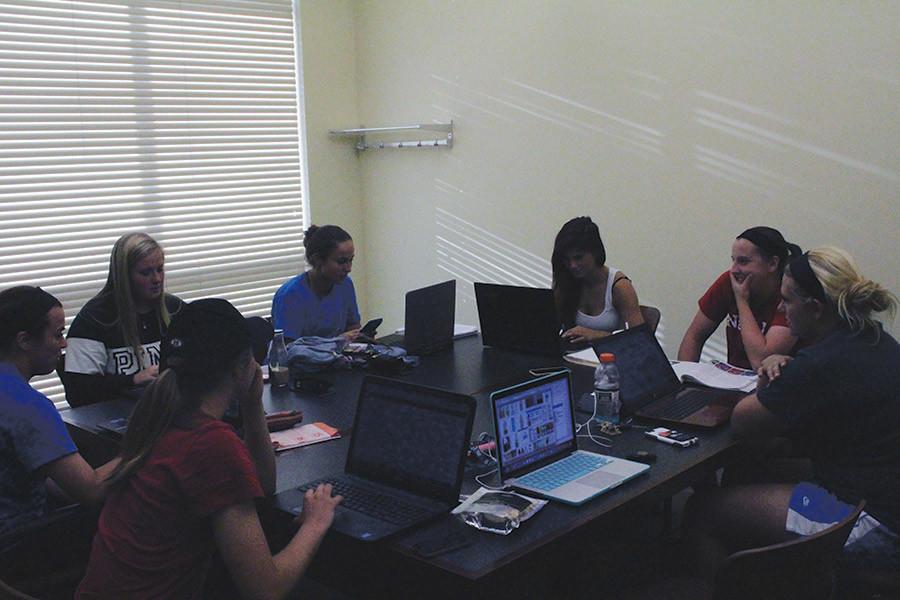Athletes balance studies and practice
Some players from the IUS softball team gather around a study table in the the library. Outfielder Montanah Rogers, biology sophomore, said that the softball team is required to go to study tables for at least two hours, two days a week.
October 19, 2015
The majority of the world dreads Mondays, but for IUS baseball player Brian Cherington, it’s “Terrible Tuesdays.”
Cherington wakes up at six in the morning and leaves for the gym at 6:30 a.m.
After spending an hour and a half lifting, he heads home for breakfast and to study for the day’s classes.
Cherington makes his way to the baseball field at 11 a.m. to throw and work out because he can’t practice with the team during normal practice hours.
From the field, it’s straight to class from 12:30 p.m. to 5 p.m. before running home to get a peanut butter and jelly sandwich.
Cherington then drives back to school for his last class of the day at 5:45 p.m.
A student athlete’s task in his or her college career is finding how to effectively balance academics, athletics and social life.
The ability to effectively manage time plays a huge role in a student athlete’s success.
“A lot of younger kids make the mistake of going out to have fun or say they are too tired from practice and put off their school work,” Cherington said.
IUS softball player Montanah Rogers, biology sophomore, agreed that good time management is the most important tool to be successful.
“Being a student athlete you have to have time dedicated to both athletics and academics,” Rogers said. “You have to keep up in school to be eligible to play.”
Rogers also discussed the choices a student athlete is faced with regarding balancing her academics, athletics and personal health.
Rogers, who also works part-time in the Activities Building, said that there are times where she has to decide whether to get the appropriate amount of sleep, or spend that time studying to help maintain her grades.
If a student athlete chooses studying over sleep then his or her performance will lack in their next competition.
If sleep is chosen over studying, the student’s grades will suffer and may risk becoming ineligible if grades drop enough.
Rogers said that Tuesdays and Thursdays each week the softball players are required to go to study tables for at least two hours.
Cherington and Rogers both said that it is difficult to find the time to eat during the day, especially a healthy, balanced meal.
“A challenge for me personally is finding time to eat throughout the day,” Cherington said. “Most days I only have two meals.”
The coaches are flexible with players and their school schedule, but student athletes are instructed to avoid scheduling class during normal practice hours unless it can’t be avoided.
For baseball players at IU Southeast, normal practice hours during the week begin at 4 p.m. and run as late as 8 p.m.
Student athletes are held accountable for the classes they miss.
Cherington said that Ben Reel, head coach for the IUS baseball team, requires his players to take a sign in sheet to class every day.
The teachers must sign the sheet and mark the time that the player brings the sheet to them, to verify that the athlete was there and on time.
Rogers gave advice to incoming freshman student athletes.
“You have to be dedicated to keep at a sport in college. You need to put all of your heart and effort to get the most out of it,” Rogers said.


